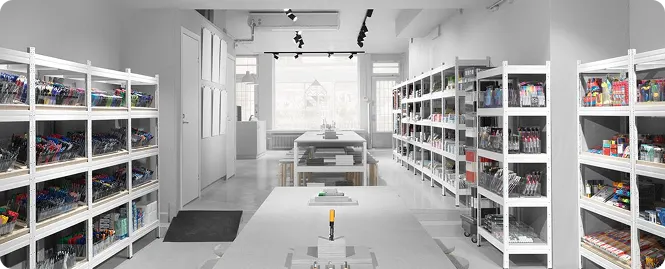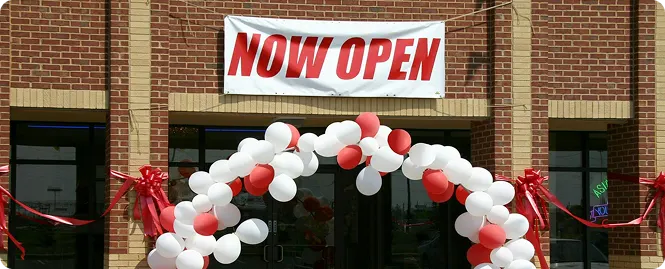How to Open a Convenience Store in Georgia
Table of Contents
Key Takeaways
-
Researching the market and choosing the right location is crucial for your store’s success. Consider foot traffic, competition, and local demand before finalizing a spot.
-
A well-structured business plan guides your operations and helps secure financing. Ensure you register your business, obtain necessary licenses and permits, and apply for an Employer Identification Number (EIN).
-
Understanding the cost of opening a convenience store is essential. Explore business loans and funding options while planning store layout, equipment purchases, and inventory selection.
-
Hiring and training staff for customer service is just as important as stocking hot foods and other products. Effective marketing and promotions can boost brand awareness and attract loyal customers.
-
A successful opening day requires testing the point of sale system, setting up displays, and ensuring all operations run smoothly. Strong execution on launch day sets the tone for long-term business success.
Georgia’s convenience store industry is thriving, thanks to its booming economy and high consumer demand for quick, accessible shopping. From bustling city centers to quiet suburban neighborhoods, convenience stores have become essential stops for busy customers. Whether they’re grabbing hot foods, last-minute essentials, or fuel, these stores cater to a fast-paced lifestyle. For aspiring business owners, opening a convenience store business in Georgia presents a lucrative opportunity—if done right with proper planning and strategy.
In Georgia, opening a convenience store isn’t just about stocking shelves and unlocking doors—it’s about building a business that thrives. From choosing the proper business structure to securing a business license and an Employer Identification Number (EIN), every step matters. Navigating licenses and permits may feel overwhelming, but getting it right from the start saves time, money, and headaches. With a solid plan, you’ll set yourself up for success in Georgia’s competitive store business landscape.
Step 1: Researching the Market and Location
The right location can either make or break your convenience store business. Look for areas with high foot traffic, easy accessibility, and proximity to residential or commercial hubs. Choosing a spot near gas stations, schools, or office buildings increases visibility and ensures a steady flow of customers throughout the day.
Before finalizing a location, analyze nearby grocery stores and other convenience stores to gauge the level of competition. Identify gaps in the market—whether it’s the lack of hot foods, specialty snacks, or extended operating hours. Understanding local buying habits helps tailor your inventory and services to effectively meet customer expectations.
A successful convenience store owner prioritizes accessibility. Locations near intersections, public transport stops, or busy streets attract more customers. When looking for sites, consider real estate costs, parking availability, and neighborhood safety. A well-placed store in a high-traffic area ensures that sales remain consistent and the business experiences long-term growth.
Step 2: Business Plan Development
A well-structured store business plan is essential for launching a successful convenience store business. Start by researching market trends, estimating the cost to open a convenience store, and outlining key operational details. A clear plan not only keeps you on track but also helps secure a business loan if needed.
Define your business goals, the services offered, and expected revenue. Would you want to sell hot foods, groceries, or specialty items? Break down projected expenses, including rent, inventory, and staffing. Understanding your financial outlook helps determine pricing strategies and funding options, ensuring your store remains profitable in Georgia’s competitive market.
Identifying your target customer base is key to effective marketing. Are you catering to commuters, students, or local residents? Use promotions, loyalty programs, and a strong point of sale system to attract repeat customers. Social media and local advertising can further boost visibility and drive foot traffic to your store.
Step 3: Legal Requirements and Permits
Before opening a convenience store in Georgia, securing the correct licenses and permits is crucial. You will need a business license, a sales tax permit, and health permits if you sell hot food items. If you plan to sell alcohol or tobacco, additional permits from state authorities will be required.
Local zoning laws dictate where convenience store businesses can operate. Check with county or city officials to ensure your chosen location complies with commercial zoning requirements. You may also need health inspections and food handling certifications, depending on services offered in your store, since compliance prevents legal issues down the road.
Register your store as a limited liability company (LLC) or any other business structure with the Georgia Secretary of State to operate legally. Obtain an Employer Identification Number (EIN) for tax purposes and a sales tax permit from the Georgia Department of Revenue to collect and report sales tax properly.
Step 4: Securing Financing
Securing funding is crucial in covering the cost of opening a convenience store in any state. You can explore business loans from banks or credit unions, seek investors, or use your personal savings. Small businesses may also qualify for government grants or SBA loans. If traditional financing isn’t an option, alternative funding sources like crowdfunding or private lenders can help. Choosing the right financing method ensures you have enough capital for inventory, equipment, and operational expenses.
Lenders and investors need a clear picture of your store’s financial viability. Prepare a professional store business plan that outlines your store’s startup costs, expected revenue, and profit margins, and make sure to include detailed financial statements, projected cash flow, and expense breakdowns. A well-organized presentation showcasing proper market research and growth potential increases your chances of securing funding. Demonstrating a solid repayment plan reassures lenders that your convenience store business is a worthy investment.

Step 5: Choosing the Right Store Format
One of the biggest decisions when opening a convenience store in Georgia is whether to go independent or join a franchise. An independent store offers full control over branding, product selection, and pricing, allowing for flexibility in business operations. On the other hand, a franchise provides brand recognition, established supplier networks, and built-in customer trust. However, franchise fees and restrictions can limit creative freedom. Understanding your budget, and long-term goals helps determine the best fit.
Independent stores typically require more effort in marketing and supplier negotiations but at the same time offer higher profit potential. Franchises, while easier to launch, come with strict guidelines and ongoing fees. Independence may be best if you prefer creative freedom and a personalized approach. A franchise might be the right choice if you value support and an existing customer base. Carefully assess your financial situation, business expertise, and market demand before making a decision.
Step 6: Store Design and Layout
A well-planned store design and layout can enhance the shopping experience and boost sales. Arrange aisles to allow smooth traffic flow and ensure essential items are easy to find. The point of sale system should be near the entrance for quick checkouts. Consider lighting, signage, and shelf heights to create a welcoming environment. Dedicate a separate food prep and display section if you sell hot foods. Organized layout keeps customers engaged and encourages repeat visits.
Strategic product placement helps leverage the consumers' buying habits. You can encourage impulse buys by placing high-demand items like beverages and snacks near the checkout counter. Keep staple items like dairy and bread toward the back to facilitate browsing. Organize the products sold by category for easy navigation. High-margin items should be at eye level, while promotional displays can attract attention near the entrance. Optimizing your convenience store layout ensures efficient space use and increased profitability.
Step 7: Purchasing Equipment and Inventory
Equipping your convenience store business with the right supplies is key to smooth operations. Some essentials include cash registers or a point-of-sale system for easier transactions, shelving for product displays, and refrigeration units for perishables and hot foods. Investing in durable, high-quality equipment ensures efficiency and long-term savings.
A successful convenience store owner builds strong relationships with trusted suppliers. By partnering up with wholesalers, you can gain bulk pricing on food, drinks, and snacks and consider local vendors for unique, in-demand products. Diversifying your supplier network helps maintain consistent stock and ensures you can quickly restock best-selling items.
Effective inventory management prevents overstocking or running out of essentials. Use a point-of-sale system to track sales and monitor stock levels. Set automatic reorder points for fast-moving items and analyze purchasing trends to adjust supply orders accordingly. A well-managed inventory system keeps your store profitable and customers satisfied.
Step 8: Hiring and Training Staff
Finding the right team is crucial for running a successful convenience store business. Look for employees who are reliable and have strong customer service skills. Experience in retail or food handling is a plus, but a positive attitude and willingness to learn are equally important. Post job listings on local job boards and social media, and conduct thorough interviews to assess communication skills and work ethic. Hiring the right people ensures smooth operations and satisfied customers.
Having staff that is well-trained enhances the shopping experience and reduces the occurrence of errors. Implement employee training programs that cover cash handling, use the point of sale system, and understanding store policies. Emphasize the importance of friendly and efficient customer service to build customer loyalty. Training should also include handling difficult situations, restocking inventory, and maintaining cleanliness. Conducting regular refreshers and performance evaluations also helps employees stay sharp and ensure your store runs efficiently.
Step 9: Marketing and Promotion
A solid marketing strategy is essential to attract customers to your convenience store business. Start by identifying your target audience and highlighting what makes your store unique—whether it’s competitive pricing, specialty hot foods, or exclusive deals. Use clear signage and eye-catching displays to create a welcoming and engaging shopping experience.
Boost visibility with local advertising through flyers, radio ads, and community bulletin boards. Offer promotions like discounts on popular items to drive foot traffic. Utilize social media to connect with customers—post updates, share special deals, and engage with followers. Running limited-time offers and contests encourages repeat visits and word-of-mouth marketing.
A strong connection with the community fosters long-term success. Support local events, partner with nearby small businesses, and offer exclusive deals to local customers. Implement loyalty programs where shoppers earn points for purchases, redeemable for discounts or freebies. A customer-centric approach helps build brand loyalty and keeps people coming back.
Step 10: Opening Day Preparations
The final step in opening a convenience store in Georgia is ensuring that everything is in place for a successful launch. Stock up on inventory, test the point-of-sale system, and have employees ready to deliver top-notch customer service. A well-organized opening sets the tone for long-term success.
Before the official launch, consider a soft opening to test store operations and gather customer feedback. This allows you to identify and fix any inefficiencies found in the store layout, cash handling, or product placement. Use this period to train the staff further and fine-tune processes before the big day.
A grand opening is the perfect opportunity to attract customers with promotions and discounts. Offer special deals on best-selling items, hand out loyalty cards, or host giveaways. Partner with local small businesses for cross-promotions and use social media to create buzz. A strong first impression builds a loyal customer base.
Conclusion
Starting a convenience store business in Georgia involves careful planning. Each step plays a crucial role, from researching the market and securing a business license to purchasing equipment and planning a marketing strategy. Following these steps, business owners can build a successful and profitable store that meets community needs.
Running a store involves risks like property damage, theft, or liability claims. Convenience store insurance protects your business from unexpected financial losses. Policies like general liability, workers’ compensation, and commercial property insurance help protect your investment. Having the right coverage ensures stability and peace of mind as your business grows.










